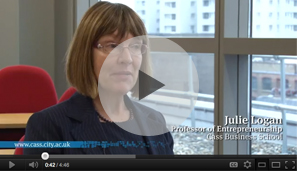Breaking the glass silo - does the voluntary sector hold the key to reaching board gender targets?
In response to Lord Davies' 2011 report on the slow rate of progress towards gender diversity in FTSE 100 and 250 boardrooms, Cass Business School, part of City University London, and the National Council for Voluntary Organisations (NCVO) are pleased to announce a new initiative.
From April to June 2012 they will be running an invitation only seminar series for outstanding female chief executives from the UK voluntary sector who are open to serving on private sector boards.
In his report Lord Davies argued boards could be strengthened by adding senior women from government, academia, the professions and entrepreneurial backgrounds. The voluntary sector is a vital additional talent pool.
Cass, which has a long history of engagement with the voluntary sector, was eager to highlight the potential of the sector's senior women. These women typically bring a wide breadth of knowledge to the table - charities are leaders in accountability, demonstrating impact, building public trust, motivating staff, stakeholder engagement, and the need to produce high quality results to a strict bottom line. Often they do this in competitive and international environments.
NCVO has pulled together a group of outstanding women chief executives in the sector, and Cass is providing these individuals with a series of top-level seminars on a pro bono basis.
The seminars, led by Cass faculty with direct experience of key PLC issues, cover subjects key to private sector board work which differ in the voluntary sector. These include corporate finance, mergers and acquisitions, the latest thinking in commercial strategy and governance (eg the role of the senior independent director).
Candidates were identified and approached by NCVO - one of the sector's leading membership organisations.
The participants are RNIB CEO Lesley-Anne Alexander, Action on Hearing Loss CEO Jackie Ballard, Canal and River Trust Vice Chair and Cass Senior Visiting Fellow Lynne Berry OBE, St John Ambulance CEO Sue Killen, Oxfam GB CEO Dame Barbara Stocking, Action for Children CEO Dame Clare Tickell, Joseph Rowntree Foundation and the Joseph Rowntree Housing Trust CEO Julia Unwin CBE.
Sessions will be followed by working dinners where the group will be joined by relevant City invitees. The meals are sponsored by executive search firms, who will be represented, giving the seminar participants opportunities to network with the people who fill private sector board vacancies.
Based in the City of London, Cass combines internationally-recognised strengths in private sector disciplines such as strategy, finance and corporate governance, with one of the largest research centres in Europe into the voluntary sector.
Cass Dean Richard Gillingwater CBE comments: "The UK voluntary sector has a number of exceptional individuals who have proved themselves by leading complex, innovative and performance-oriented organisations delivering in turbulent environments. Some of these organisations operate in the toughest countries overseas; the turnover of some exceeds £100m. These chief executives have learned how to lead thousands of people in highly ethically conscious environments; how to earn and keep the public's trust and manage valuable brands; how to grapple with governments while preserving independence; and - fundamentally - how to thrive in an income-uncertain world while sticking close to purpose.
This initiative could make a real difference to the diversity of experience as well as gender on major FTSE boards within twelve months. Although there are positive examples such as BT's appointment of Jasmine Whitbread, CEO of Save The Children International, to its main board last year, there is evidence that FTSE 100 boards do not always have a good grasp of how big the challenges of running a large voluntary organisation are."
Sir Stuart Etherington, Chief Executive of NCVO, said "This initiative reflects a broad consensus across the main political parties and many business and investor groups in support of "responsible capitalism". It is an excellent example of how we can practically support talented women with vast experience in the voluntary sector to get significant roles in companies across the UK. We were pleased to be involved in this programme from the very beginning as it addresses two key issues - gender equality across UK PLC and the contribution the voluntary sector can make to the decisions taken by our most successful companies."
Lynne Berry OBE, who is both participating in the series and carrying out a piece of research based on the participants' experiences, says: "Women in the voluntary sector are trying to break through a glass silo rather than a glass ceiling. The women we are talking about are extremely experienced at both executive and non executive level on public and voluntary boards. Between them they have run some of the largest organisations in this country, but the corporate sector has been slow to recognise the relevance of their skills."






